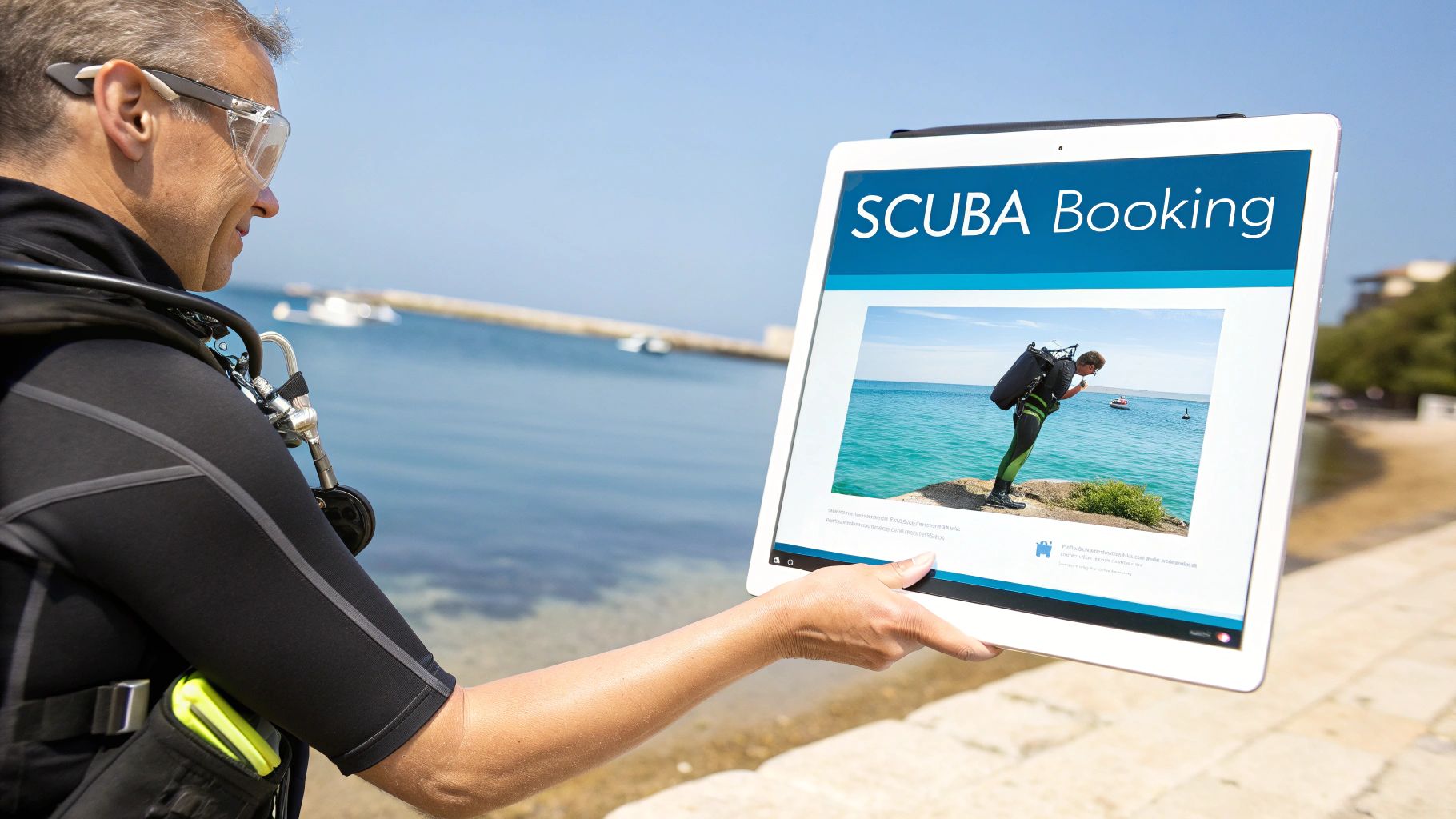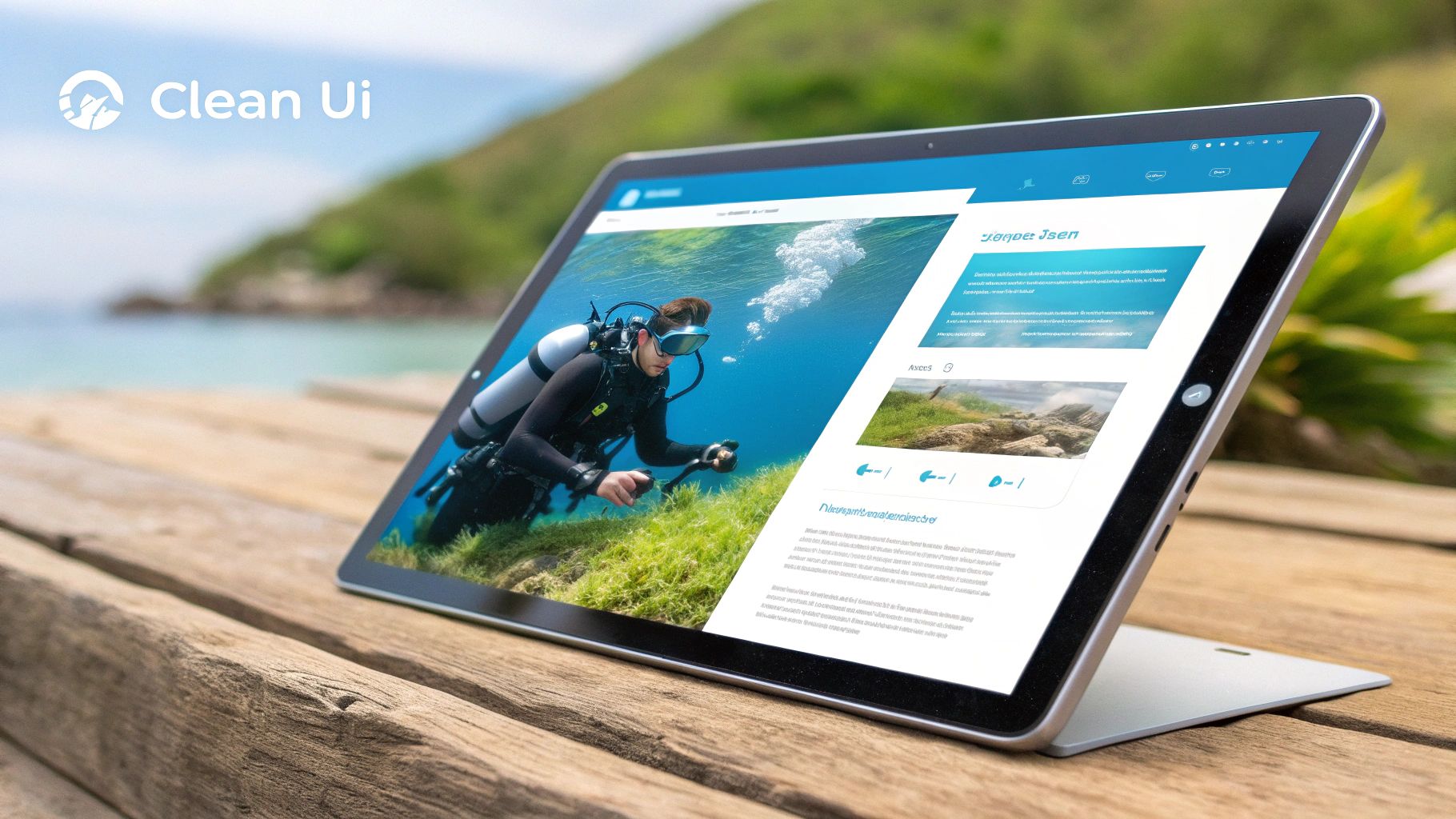Why Your Dive Centre Needs a Modern Scuba Booking System

The UK diving scene is experiencing a surge in popularity, bringing with it both exciting opportunities and increased competition. Customer expectations are also changing. To thrive in this dynamic environment, dive centres need to prioritize operational efficiency and deliver exceptional customer service. This is where a modern scuba booking system, like Dive Admin, becomes indispensable. These systems optimize operations, enhance customer satisfaction, and ultimately contribute to a healthier bottom line.
Streamlining Operations for Maximum Efficiency
One of the most significant advantages of using a modern booking system is the substantial reduction in administrative tasks. Think about automating processes such as dive scheduling, equipment rental management, and payment processing. This frees up valuable staff time, allowing them to concentrate on crucial aspects of the business, like customer interactions and providing top-notch dive instruction. Instead of manually verifying certifications, your team can focus on delivering comprehensive pre-dive briefings and ensuring a safe and enjoyable diving experience.
Furthermore, a purpose-built scuba booking system is designed to handle the specific intricacies of dive operations much more effectively than generic booking software. Essential features like certification verification, equipment allocation, and dive site management are often absent in generic platforms. This can lead to workarounds and manual processes, negating the time-saving benefits of using a booking system in the first place.
Enhancing the Customer Experience
A modern booking system isn’t just about improving back-end efficiency; it directly impacts the customer experience. A user-friendly online platform empowers customers to easily browse available dives, book slots at their convenience, and manage their bookings online. This eliminates the need for phone calls and emails, resulting in greater customer satisfaction and loyalty. Automated reminders and updates keep divers informed and engaged, leading to a smoother, more professional experience overall.
This enhanced customer experience is particularly vital given the anticipated growth of the UK diving tourism market. In 2023, this market generated $383.8 million in revenue. Projections indicate a 9.8% annual growth rate through 2030, reaching $736.3 million. The demand for seamless booking experiences will undoubtedly rise alongside this market expansion. This also underscores the need for systems capable of handling specialized bookings, such as marine conservation trips or advanced training courses. Discover more about this growth here.
Gaining a Competitive Edge
In a competitive landscape, the right scuba booking system can be a key differentiator. By offering online booking, automated communications, and personalized services, dive centres can attract new customers and build loyalty with existing ones. Streamlining operations and reducing costs allows centres to offer competitive pricing and reinvest savings into service improvements. This translates to a stronger market position and increased profitability. Investing in a modern scuba booking system is an investment in the future of your dive centre. It allows you to adapt to market changes, enhance customer experiences, and flourish in the dynamic world of UK diving.
Essential Features That Make or Break Your Booking Experience

Choosing the right scuba booking system can significantly impact a dive center’s success. Understanding essential features separates truly effective platforms from the rest. These features streamline operations and enhance the customer booking experience.
Must-Have Features For A Smooth Operation
Several key features are vital for any scuba booking system. Real-time availability management is crucial, preventing double-bookings and ensuring accurate scheduling. It’s like a digital dive slate, constantly updated with the latest information.
This feature is particularly important in competitive diving markets. In 2023, for example, approximately 49,000 people in England participated in scuba diving or snorkeling. This makes real-time availability even more critical for dive operators. More detailed statistics can be found here.
Integrated payment processing simplifies transactions and reduces administrative overhead. It streamlines the customer experience, removing the hassle of manual invoices. Automated certification verification also protects both businesses and customers, ensuring divers meet safety requirements. These features are becoming essential as smaller operators adopt cloud-based systems for managing international partnerships.
Mobile Optimization and Multi-Language Support
A mobile-friendly booking system is a must. Customers can book on the go, increasing convenience. Multi-language support expands reach, attracting international divers and broadening the customer base. This is particularly relevant for dive centers catering to global tourists.
Streamlining Inventory Management
Integrating equipment inventory within the booking system streamlines operations. It reduces manual reconciliation and prevents overbooking equipment. This automation saves time and ensures accurate tracking. Dive centers can learn more about sitemap management at How to master your sitemaps.
This efficiency allows staff to focus on customer service and memorable dive experiences. Choosing the right booking system maximizes efficiency, enhances customer experience, and drives business growth.
To help dive operators choose the right booking system, we’ve compiled a comparison table:
Essential Scuba Booking System Features Comparison
A detailed comparison of must-have features across different tiers of scuba booking systems, helping dive operators identify which solution best matches their operational needs
| Feature | Basic Systems | Mid-Range Solutions | Premium Platforms | Importance Rating |
|---|---|---|---|---|
| Real-time Availability Management | Limited | Yes | Advanced Features (e.g., waitlists) | Essential |
| Integrated Payment Processing | Basic | Multiple Gateways | Multiple Gateways + Recurring Billing | High |
| Automated Certification Verification | No | Limited | Integrated with Certification Agencies | High |
| Mobile-Friendly Interface | Basic | Responsive Design | Native Mobile Apps | Essential |
| Multi-Language Support | No | Limited | Multiple Languages | Medium |
| Equipment Inventory Integration | No | Basic | Advanced Tracking & Reporting | High |
| Customer Relationship Management (CRM) | Basic | Contact Management | Comprehensive CRM with Marketing Automation | Medium |
| Reporting & Analytics | Basic | Standard Reports | Customizable Reports & Analytics Dashboard | High |
This table highlights key differences in features across various booking system tiers. Basic systems offer limited functionality, while premium platforms provide advanced tools like automated certification verification and comprehensive CRM.
By considering these features and using this comparison table, dive centers can select a system that best aligns with their needs and budget, ultimately contributing to their success.
Implementing Your Scuba Booking System Without Disruption

Switching over to a new scuba booking system can seem daunting. But, with a solid plan, you can avoid common problems and make the change smoothly. This section offers a practical guide based on the real-world experiences of UK dive centre operators.
Data Migration: Starting With a Clean Slate
A successful implementation relies on clean data migration. It’s like transferring your old paper logbooks into a digital system. This usually involves exporting your current customer data, cleaning it up to fix any errors or duplicates, and then importing it into your new system. Accurate data from the beginning is essential for good reporting and personalized customer service.
Staff Training: Empowering Your Team For Success
A new booking system means your staff needs training. Your team should feel comfortable using the new tools. This means offering complete training on everything from the basics to advanced features. Hands-on practice and support will minimize resistance and encourage everyone to use the system.
Consider appointing “system champions” within your team. These individuals can help their colleagues, building expertise and ownership within the group. This team-based approach empowers your staff and makes the change easier.
Phased Rollout: Minimising Disruption
A phased rollout is often the best way to reduce disruptions. This means introducing the system step-by-step. You might start with online bookings, then add equipment rentals, and finally, integrate other features like certification checks. This gives you room to adjust along the way.
Avoiding Implementation Pitfalls
Insufficient testing and poor communication can cause problems. Thorough testing is key to finding and fixing any issues before they affect your customers. It’s also important to communicate clearly with your customers about the new system, its benefits, and any changes to the booking process.
For example, offer a small discount for early users of the online booking platform. This encourages adoption and provides valuable feedback. You may also find our resources on sitemaps helpful. Check out our guide on How to master your sitemaps.
Timeline and Resource Allocation
Implementation time depends on the size and complexity of your operation. Smaller centres might finish in a few weeks, while larger ones could take months. Plan enough resources, including staff time and budget, for a successful changeover.
Integration With Existing Workflows
Your new system should fit in with your current processes. This could mean connecting it to your payment system, integrating with your customer database, or automating communications. A well-integrated system streamlines your operations.
Planning and following these steps will help you make the transition smoother. By addressing potential problems early, your new booking system will improve your efficiency and make your customers happier, resulting in a stronger, more profitable business.
Leveraging Your Scuba Booking System for Sustainability

Today’s divers are increasingly aware of their environmental impact and actively seek out eco-friendly experiences. This presents a fantastic opportunity for UK dive centres. By incorporating sustainability features into their scuba booking systems, they can attract this expanding market while playing a vital role in ocean conservation.
Promoting Eco-Friendly Practices Through Your Booking Platform
Your booking system can be a powerful advocate for sustainable diving. Highlight eco-friendly dive sites, showcasing their unique biodiversity and ongoing conservation efforts. This empowers customers to choose dives that align with their values.
You can also promote carbon-neutral diving options. Consider offering carbon offsetting programs or partnering with local transport providers focused on reducing emissions. This makes sustainable choices easier for environmentally conscious divers.
Streamlining Conservation Efforts With Technology
Use your booking system to streamline bookings for marine conservation activities. Create dedicated portals for events like reef cleanups or underwater surveys. This simplifies logistics and encourages participation.
Furthermore, transitioning to digital waivers and certifications significantly reduces paper waste. This simple change contributes to a more sustainable dive centre operation.
Showcasing Your Commitment to Sustainability
Your booking system can highlight your commitment to conservation. Feature information about your sustainability initiatives and partnerships within the booking process, allowing customers to see your dedication firsthand.
Educate customers about responsible diving practices through your system. Incorporate educational resources or promote sustainable dive gear, raising awareness and fostering responsible behavior within the diving community.
Measuring the Impact of Sustainability
Tracking key metrics within your booking system demonstrates the positive impact of your sustainability efforts. Monitor bookings for eco-friendly dives and track the reduction in paper usage. These tangible results highlight the business benefits of integrating sustainability.
Between 2025 and 2035, the UK diving tourism market is predicted to grow significantly, with sustainability a key factor. Learn more about this projected market growth here. This growth underscores the need for modern booking systems that prioritize features like carbon-neutral trip options and gear rental quotas, contributing to both competitive advantages and brand differentiation in the UK’s eco-conscious diving market.
Measuring ROI: Making Your Scuba Booking System Pay Off
Investing in a scuba booking system is a significant decision for any UK dive centre. How can you be sure it’s a smart investment? This section offers a framework for evaluating the return on investment (ROI) of your new system, using insights from the financial performance of several UK dive centres.
Understanding the Costs and Benefits
Calculating ROI means balancing the costs with the benefits. Initial costs include the system’s price, setup, and staff training. Ongoing costs might include subscription fees, software updates, and routine maintenance. Keeping track of these expenses is crucial.
But a well-chosen scuba booking system delivers significant benefits. Increased booking conversion rates are a common advantage, because online booking makes it easier for customers to schedule dives. This can boost revenue and improve how efficiently you use your resources. Also, automating administrative tasks with a booking system can free up staff time. This allows your team to focus on other important aspects of your business, such as customer service and dive instruction.
Quantifying the Returns
Successful UK dive centres are measuring the positive impact of their scuba booking systems in various ways. They track the growth of ancillary revenue, like equipment rentals and merchandise sales, made easier by smoother booking processes. Better customer retention is another key metric. By providing a seamless booking experience and personalized communication, dive centres build customer loyalty, which leads to repeat business and positive reviews.
Furthermore, booking systems offer useful data insights. They collect information about customer preferences, booking trends, and other valuable data that can inform business decisions. This information allows dive centres to optimize their services, target marketing campaigns, and refine their overall business strategy. For example, improving your website’s structure can increase your visibility online. You might find this resource helpful: How to master your page sitemaps.
Timeframes and Negotiation Strategies
The time it takes to see a positive ROI depends on factors like the size of your dive centre and how many bookings you typically handle. Smaller centres with fewer bookings may see a return within a few months, while larger operations might take longer. However, the long-term benefits, such as improved efficiency and stronger customer relationships, are often substantial.
UK dive operators have successfully negotiated better terms with booking system vendors. By understanding the market and communicating their specific needs effectively, they often get better pricing and contract terms, which can improve their ROI.
Building a Compelling Business Case
Creating a convincing case for a scuba booking system requires clear financial projections. By showcasing the potential for increased revenue, lower costs, and greater customer satisfaction, dive centres can justify the investment to stakeholders. Using a table to present ROI projections is a great way to visualize the financial benefits.
To help you analyze the potential ROI, let’s look at a breakdown of costs and benefits. The following table illustrates key financial metrics you should consider.
Scuba Booking System ROI Calculator
Key financial metrics to consider when evaluating the cost-benefit relationship of implementing a scuba booking system
| Cost/Benefit Category | Low Estimate | Medium Estimate | High Estimate | Notes |
|---|---|---|---|---|
| Implementation Costs | £500 | £1,000 | £2,000 | Includes software purchase, setup, and training. |
| Ongoing Costs (Annual) | £200 | £400 | £600 | Includes subscription fees, updates, and maintenance. |
| Increased Bookings (Annual) | 10% | 20% | 30% | Based on improved online visibility and booking convenience. |
| Reduced Admin Hours (Annual) | 20% | 40% | 60% | Reflects automation of booking and admin tasks. |
| Improved Customer Retention (Annual) | 5% | 10% | 15% | Assumes enhanced customer experience and loyalty. |
By using this framework and building a solid business case, UK dive centres can confidently invest in a scuba booking system that improves operational efficiency and delivers a solid return on investment.
Future-Proofing: Tomorrow’s Scuba Booking Technologies
The scuba diving industry is constantly evolving, changing how dive centers operate and shaping customer expectations. This look ahead explores emerging booking technologies UK dive centers should consider to stay ahead of the curve.
AI-Powered Demand Forecasting and Dynamic Pricing
Imagine a booking system that predicts demand and adjusts prices accordingly. That’s the potential of AI-powered demand forecasting. This technology analyzes historical booking data, weather patterns, and even social media activity to anticipate customer interest. Dive centers can then implement dynamic pricing, optimizing revenue by adjusting prices in real-time. During peak season, prices could increase slightly, while discounts could be offered during quieter periods to encourage bookings. This not only maximizes profit but improves resource management.
Seamless Dive Experiences Through Integration
Integrating booking systems with underwater navigation systems like DiveNav represents another exciting advancement. Think of it as a GPS for your dive, connected to your booking platform. Divers could plan routes before their dive, log key data during the dive, and even share their underwater experiences directly through the platform. This creates a more engaging customer experience, linking pre-dive planning with the dive itself. This integration also creates opportunities for real-time safety monitoring and improved dive management.
Virtual Reality and Enhanced Customer Engagement
Virtual Reality (VR) is transforming how divers explore potential dive sites. Imagine offering potential customers a VR preview of a wreck dive or a coral reef. This immersive experience lets them experience the thrill of a dive before even getting wet, generating excitement and encouraging bookings. A UK dive center could offer a VR experience of diving with seals in the Farne Islands, creating an enticing preview of their trips. This technology not only boosts bookings but increases customer engagement and builds anticipation.
Positioning Your Business for the Future
These technological advancements offer significant opportunities for UK dive centers to differentiate themselves. By carefully evaluating new technologies, centers can identify genuine competitive advantages. Practical strategies include engaging with technology providers like Dive Admin, attending industry events to remain current, and piloting new features with select customer groups for feedback. Learning from early adopters in the UK diving community is crucial. Observing the impact on their customer acquisition and loyalty provides key insights into which technologies offer the greatest returns.


